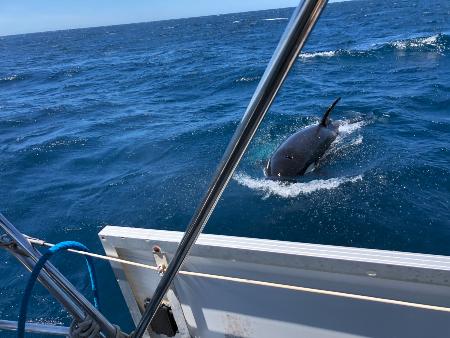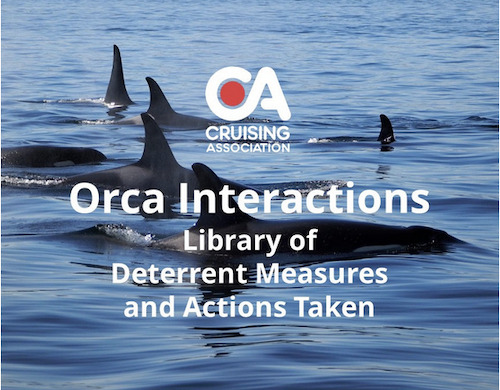Orcas: Sea Trials of New Acoustic Deterrent Device
After years of orcas “playing” with yachts along the Iberian peninsula and causing a significant amount of damage, sea trials are underway in the area to test a new acoustic deterrent device, which if successful will be available to yacht owners for the 2024 season.
Published 7 months ago
The new acoustic deterrent device is to be tested in the waters off Portugal to see if it will deter Orcas from interacting with boats. If Orcas are still in the vicinity off the Portuguese coast it is anticipated sea trials will commence in mid-October according to Edinburgh-based GenusWave which has developed the device.
For years, the mainly juvenile cetaceans have been ‘playing’ with boats along the Iberian Peninsula, touching, pushing and pivoting on vessels. In some cases this disruptive behaviour by the orcas has resulted in damage to the stern, mainly on the rudder; three boats have also been sunk as a result of the damage.
Portuguese and Spanish scientists at Grupo Trabajo Orca Atlantica (GTOA) have been studying the behaviour of the Orcas since 2020, and are working in collaboration with Instituto da Conservação da Natureza e das Florestas (ICNF), the Portuguese government department responsible for Nature Conservation and Forests, and the Cruising Association, which is gathering data on Orca interactions.


The acoustic deterrent device created by the Edinburgh-based GenusWave – Targeted Acoustic Startle Technology – known as TAST – is designed to trigger the instinctive startle reflex most animals have when they hear a particular sound.
This reflex, governed by the autonomic nervous system, induces an involuntary flight response, compelling targeted animals to flee the immediate area.
TAST was originally developed to deter seals from fishing nets, and has been modified to work on sea lions and Orca. In November 2021 and 2022, trials took place on fishing grounds in Kvænangen in north Norway to ascertain how effective TAST was in deterring Orca from fishing boats.
Scientists counted Orca before, during and after the fishing boat emitted a sound. Each phase lasted five minutes. Satellite marked the animals to measure their response to the startling sounds, and the Orca quickly returned to the site when the noise subsided.
The findings determined that the GenusWave signal resulted in:
- An 85% reduction in Orca sightings on the fishing grounds during playback of the audio signals compared to before playback.
- A deterrent range that was predominately 0-50m from the sound source.
- No harm to Orca from the sound.
- No lasting exclusion from the area once the sound was turned off.
According to ICNF and GenusWave, if the Orcas are still in the vicinity off the Portuguese coast it is anticipated sea trials will commence in mid-October.
If the trials proceed, skippers will be asked to contact the ICNF/GenusWave to alert them if Orcas are spotted. Details on how to contact the ICNF/GenusWave will be released at www.theca.org.uk/orcas


According to GenusWave, if the trials are successful, it is anticipated that acoustic deterrent devices for yachts will be made available for the 2024 season.
……………………………………….
Related News:
- Sea Trials of new Orca Deterrent Device to keep Orcas at Bay – Practical Boat Owner
- Orca Project Update – Cruising Association
……………………………………….
Related Links:
- Noonsite Cruising Resources: Orcas and Yachts
- Cruising Association: Orcas Interaction Page
- CA Orca Interaction and Uneventful Passage Reports
- Orca Attack Reports Facebook group
……………………………………….
Find out all news, reports, links and comments posted on Noonsite, plus cruising information from around the world, by subscribing to our FREE monthly newsletter. Go to https://www.noonsite.com/newsletter/.
Related to following destinations: Aveiro, Cascais, Figueira da Foz, Leixoes (nr Porto/Oporto), Lisbon, Nazare, North West Spain, Oeiras, Peniche, Porto (Oporto), Portugal, Povoa de Varzim, Sesimbra, Setubal, Sines, South Coast (Algarve), South West Coast (Spain), Spain, Troia, Viana do Castelo
Related to the following Cruising Resources: Orcas and Yachts, Safety and Medical, Services and Equipment





